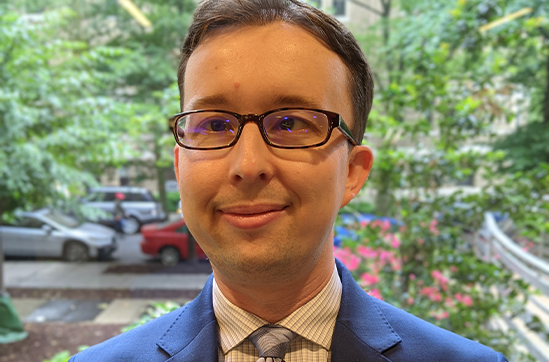At CMS, Alum Bryan Kirk (SPH’16) Driven to Get ‘Quality, Affordable Healthcare to People’.
According to the Affordable Care Act (ACA), insurance plans listed on public health insurance exchanges must cover all essential health benefits and must not include provisions that discriminate on the basis of race, color, national origin, disability, age, or sex. But who is checking to ensure that’s the case?
For exchanges in Arizona, Georgia, Florida, and 14 other states that leave the plan-certification process to the federal government, School of Public Health alum Bryan Kirk (SPH’16) is checking.

Kirk, who earned his MPH with a certificate in health policy and management, is a health insurance specialist for the Center for Consumer Information and Insurance Oversight (CCIIO), a division of the Centers for Medicare & Medicaid Services (CMS). One of his many responsibilities is to lead a team that reviews public insurance plans for discriminatory behavior in benefit design and in cost sharing—ensuring, for example, that plans don’t discriminate by age by only covering hearing aids for young patients, or that plans don’t place annual dollar limits on essential services.
“Health equity is something that I’m really passionate about,” says Kirk. “I love all the work that I do, but the non-discrimination work I get to lead is my favorite.”
Kirk joined CMS in 2019 after graduating from SPH and then working with the Peace Corps in Belize. In addition to reviewing plans for compliance with ACA rules, he also conducts URL reviews, confirming that the information insurers post online about their plans matches the information they’ve supplied to CMS. “If that consumer-facing information is out of alignment with what we’ve approved, with what the state has approved, that directly causes consumers harm,” Kirk says. “There’s a lot of confusion if that stuff doesn’t match up.”
Another part of Kirk’s job is managing large IT projects aimed at making CCIIO more efficient. His first big project was building a new system for collecting URLs from insurance providers. In the past, if insurers wanted to update any of the links on healthcare.gov that lead to information about their plans, it took four to six weeks to process the data-change request. Today, the process takes just a week or two.
Working for CMS can be challenging, Kirk says, because the center’s work is so very complicated: insurance regulations vary from state to state, different states have different models for their marketplaces, and Kirk and his colleagues can only do what is explicitly outlined in the law. But the work is also rewarding.
“Ultimately, what drives us all to do our work in CMS,” Kirk says, “is getting quality, affordable health care to people. CMS is really mission driven in a way that I haven’t necessarily experienced in other places I’ve worked. Everybody really cares, and we want to do as much as we possibly can to get to that outcome for people.”
Helping to operate our county’s healthcare system has reinforced Kirk’s belief that health care in the United States needs to be simpler and has inspired him to pursue a doctorate in public health. He began the doctoral program in health policy at George Washington University last fall, he says, with the goal of moving from operations roles to roles that focus on changing policy. “I really want to keep climbing up and doing as much as I can to help improve the US healthcare system,” he says.